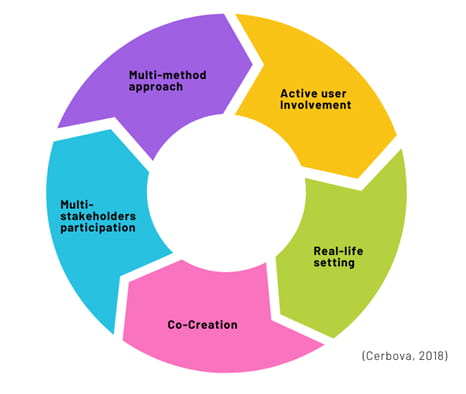Health Innovation and Co-Creation Research Group
A living lab approach to innovation facilitates the development and testing of new or existing technologies and innovative ways of living within the person’s real life and natural living environment.
The centre’s definitions of a living lab is a pragmatic research environment which openly engages all relive the partners with an emphasis on improving the real-life care of people living with a health condition through the use of economically viable and sustainable innovations (Smith, 2015).
Our centre is currently the only European Network of Living Labs (ENoLL) accredited lab in the Liverpool City Region. There are currently 400 living labs globally, 200 of which are accredited. In the UK there are 21 living labs, 10 are accredited. The centre is one of three accredited living labs in the UK.

Timeline
-
1823
Liverpool Mechanics' School of Arts
The University was founded in 1823 as the Liverpool Mechanics' School of Arts. In 1992 following an act if Parliament, the university became Liverpool John Moores University, named after a local businessman and philanthropist.
-
2012
The Living Lab
The Living Lab was created through the Innovate Dementia Project carried out in on 1st April 2012. LJMU worked alongside local mental health trusts and European partners to explore ways of developing innovative approaches to Dementia care. With this project, we became an accredited living lab via ENoLL.
-
2016
The Health Innovation Exchange project
The Health Innovation Exchange project aimed to address market failures and exploit opportunities for economic growth in the health, social care and innovation sector.
-
2016
Health Innovation Experimental Landscape through Policy Improvement (HELIUM)
The Health Innovation Experimental Landscape through Policy Improvement (HELIUM) intended to amplify the development of health innovation and economic growth through sharing knowledge and ensuring more opportunities are created to implement new technology in health.
Health Innovation Exchange project
The Health Innovation Exchange project aimed to address market failures and exploit opportunities for economic growth in the health, social care and innovation sector.
-
2019
The Liverpool Health Matters programme supported local businesses with access to the health and care markets, by providing bespoke one-to-one assistance. We aided businesses to hone their products and services.
-
2020
CYP as One
Funded by NHS England and in collaboration with Alder Hey Children’s NHS Foundation Trust, this project allowed for the creation of a unique web-based platform allowing for easy mental health referral and appointment booking for children and young people in Liverpool and Sefton. The web-based platform can be seen here: http://www.seftonliverpoolcamhs.co.uk/.
-
2022
Invention for Innovation (i4i)
The i4i project is currently underway and is a continuation of the CYP as one project where we are evaluating whether the original paper-based method of mental health referral or the new web-based platform is more efficient in aiding the referral process. Through this project, we are also hoping to address the challenges and issues children, young people and parents face during mental health referral and will use these issues to further improve the referral system in the future.
Publications
Loading publications…
Contact us
If you’d like to ask a question or find out more about this group, please contact the team using the details below.
Contact: Grahame Smith
Call: +44(0)151 2314115
Email: G.M.Smith@ljmu.ac.uk


